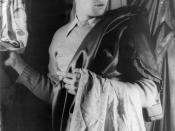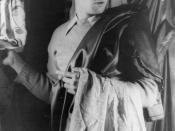The 1955 social drama ÃÂRebel Without a CauseÃÂ is a powerful archetype of both its genre and the period of social upheaval that it portrays. Playing the lead role of Jim Stark, actor James Dean personifies the filmÃÂs central theme, a tortuous longing to belong and be loved, unconditionally.
The Stark family, whoÃÂve recently migrated to suburban Los Angeles, are seeking a fresh start and rehabilitation of their delinquent teenage son. Their aspirations echo the universal theme of yearning for acceptance. Even the family name is metaphor for their hollow portrayal of the mythical blissful nuclear family unit. ItÃÂs not the first time they have tried to stitch the threadbare fabric of urban conformity. Once again, that tattered shroud is shredded by JimÃÂs rebellion against his parentsÃÂ warped charade prevailing middle-American values. Director Nicholas Ray continues to explore the genre by exposing the shifting social roles for a boy becoming a man, girl to woman, husband and wife, and finally parents/role-models.
After his arrest for public drunkenness, Jim screams at his squabbling parents, ÃÂYouÃÂre tearing me apart!ÃÂ This first of many crises faced by the male lead, stems from the incongruity of the current social norms and the reality of his family life. Confiding to a police officer he says, ÃÂIf I had one day when I didnÃÂt have to feel all confused. Felt that I belonged some place.ÃÂ His confusion is rooted in the role reversal of his parents, as his mother dominates his subservient father. Jim tells the officer, ÃÂIf he had guts to knock Mom cold once, then maybe she'd be happy and then she'd stop picking on him. Because they make mush out of him! Just mush!ÃÂ Jim struggles to explain that while he loves his father he has no respect for him as a man. Acknowledging the youthÃÂs dilemma, the officer offers himself as an alternative role-model and confidant. ItÃÂs insightful of the misogynistic post-war values that JimÃÂs remark was met with acceptance and an offer of a surrogate father-figure.
The social norms of the time held that the man was the head of the house and his word was final. This is exemplified by the parents of the other lead character, JimÃÂs love interest Judy. Her torment stems from trying to maintain an emotionally fulfilling relationship with her authoritarian father, who is increasingly uncomfortable with his daughterÃÂs development into a young woman. In the opening scenes she recalls his reaction to her wearing lipstick saying, ÃÂHe called me a dirty tramp! My own father.ÃÂ Later he hits her across the face for kissing him on the cheek. After realizing his overreaction and trying to make amends, the father is consoled by his doting wifeÃÂs assurance that their daughter is just at a difficult age.
A poignant reminder of the isolation with which all the characters are grappling, comes from the astronomerÃÂs commentary at the planetarium. Reflecting on the EarthÃÂs insignificance in the universe he witheringly remarks, ÃÂThrough the infinite reaches of space, the problems of man seem trivial and naïve indeed, and man, existing alone, seems himself an episode of little consequence." JimÃÂs schoolmate Plato is frightened by the presentation, but Jim comforts him in a fatherly sense. His strength of character is quickly put to the test, as a gang of seniors provoke him into a knife fight. Despite winning, he agrees to a ÃÂChickie runàin a further initiation of the new stag into the herd. After agreeing to take part, he asks his friend what ÃÂChickie runàmeans, revealing his vulnerable side, beneath the tough façade. It is also perhaps a subtle dig at the ever-changing jargon of teenagers and further bid to connect with younger audiences.
JimÃÂs crisis of social acceptance is compounded by troubles at home. Despite repeatedly pleas, Jim never gets a real answer when he asks his father, ÃÂWhat do you do when you have to be a man?ÃÂ His emasculated fatherÃÂs hopeless role model turns farcical when Jim returns from the cliff tragedy to find him wearing a frilly apron and picking up spilled food for fear his wife will see it. Jim confesses that he knew the inherent dangers he faced, but had to race. ÃÂThey called me chicken. I had to go. If I didnÃÂt IÃÂd never be able to face those kids again,ÃÂ he says.
As art imitates life, the story paralleled part of a new wave of films, which rebelled against the nostalgic pre-war idealism. Since the arrival of television, the average age of moviegoers had fallen significantly. The younger crowd craved plots and characters with which they could identify. Already attuned to the rebellious messages of another revolutionary social tidal wave, rock and roll, patrons sought the same theme on the big screen. The icon of this new cinema was the anti-hero.
There were two actors who came to epitomize this new role, which required being simultaneously strong and gentle, menacing and vulnerable. James DeanÃÂs portrayal of the troubled Jim Stark is one and the other is exemplified by Marlon Brando in ÃÂA Streetcar Named Desire.ÃÂ BrandoÃÂs anguished cry as Stanley, ÃÂHey, Stella! Hey, Stellaaa!ÃÂ resonates DeanÃÂs sentiment as Jim screaming ÃÂYouÃÂre tearing me apart.ÃÂ Both films are set in the tumultuous period following World War Two and both wrestle with the growing pains of defining gender roles and relationships in a rapidly changing world.
The resolution won in the final scene of ÃÂRebel Without a Causeàcomes at a heavy price, the death of two teenage boys. The tragic experience cements the bond between Jim and Judy. The Starksàfaux reality finally shatters their façade, when the fear of losing their son finally catalyzes the father into promising, ÃÂIÃÂll try to be as strong as you want me to be.àThe acknowledgement of past failing, and a desire to build a brighter and honest future, echoes across the social spectrum. The world has changed, for individuals, the arts and society as a whole. This movie, like its underlying ideals of honesty, compassion and the need to be loved, remain true and timeless.
Works CitedÃÂA Rebel Without a Cause.ÃÂ Imdb.com. Amazon.com. Undated (Viewed 22 Oct. 2009)Dirks, Tim. ÃÂFilm History of the 1950s ÃÂ Part 1ÃÂ filmsite.org. American Movie ClassicsCompany LLC. Undated (Viewed 22 Oct. 2009)ÃÂA Streetcar Named Desire.ÃÂ Imdb.com. Amazon.com. Undated (Viewed 22 Oct. 2009)Wood, Chris. archive.sensesofcinema.com. The Canadian Journal Of Irish Studies,Spring 2000

